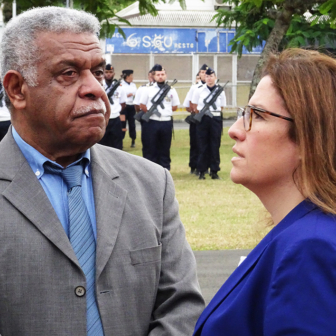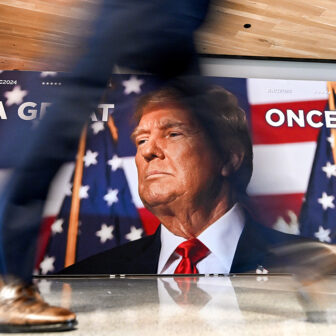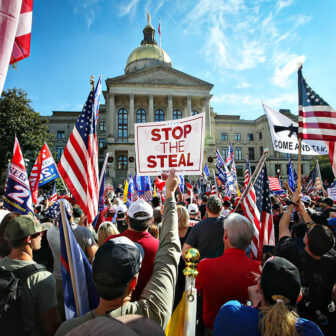Much of the English-language reporting of German politics since the September national election has centred on two claims: that Germany is adrift without a government, and that the country has lurched to the right. It’s true that a new government is yet to be formed, and it’s unarguable that the far-right populist Alternative für Deutschland, or AfD, won seats in the Bundestag. But that doesn’t mean that either of those broader claims is correct.
Neither Angela Merkel’s Christian Democrats nor Martin Schulz’s Social Democrats won an absolute majority in September. As has happened after every previous national poll, the elections were followed by talks about the formation of a coalition government. (Even on the one occasion when the Christian Democrats and their Bavarian sister party, the Christian Social Union, won an absolute majority, in 1957, those talks took place, and West Germany again ended up with a governing coalition.)
This year, for the sixteenth time, the Christian Democrats and their Bavarian counterpart won more seats between them than its large rival, the Social Democrats. Under these circumstances, a coalition without the Christian Democrats is technically possible; in practical terms, it is the only realistic contender to lead a new government.
What was different this time was that nobody seemed in a hurry to commence the coalition talks. In fact, virtually nothing happened for three weeks. Angela Merkel, the only politician realistically in a position to invite others to sit down and negotiate, kept her own counsel while she and other leading politicians fought another election campaign, this time in the West German state of Lower Saxony.
Once the talks got under way, they were slowed and complicated by two factors. The first was the experience of two parties that have recently been in coalition with Merkel’s Christian Democrats. The Free Democrats won almost 15 per cent of the vote in 2009 and were the minor coalition partner over the four years in Merkel’s second government, 2009–13. But most Free Democrat voters disapproved of the party’s performance and punished it at the next polls, where it failed to reach even the 5 per cent threshold to sit in the Bundestag. As a result, the party was only willing to be part of a coalition that could be perceived to be dancing to a Free Democrat tune. With Merkel at the helm, that was never likely, and so the Free Democrats showed no great enthusiasm for being part of another coalition with the Christian Democrats.
The Social Democrats were also burnt badly by serving under Merkel. After a four-year partnership with the Christian Democrats between 2013 and 2017, they won a paltry 20.5 per cent of the vote — the party’s worst national result since the founding of the Federal Republic in 1949. Even as the votes were being counted, the party’s leadership decided to rule out another GroKo, or Grosse Koalition, the term used to denote a coalition between the two major parties.
The second factor reflects the strength of two parties considered ineligible to help form government. For the first time in history, the new Bundestag includes a significant number of members — 153 out of 709 — who were elected on the ticket of either the AfD or the Linke (or Left), the successor party to East Germany’s pre-1990 Socialist Unity Party. With both the Christian Democrats and the Social Democrats ruling out a coalition with AfD or Linke, the government will have to command not just a majority of seats but also a majority of the seats not held by AfD and Linke.
In the immediate aftermath of the election, this appeared to leave only one option: a coalition government of Christian Democrats, Free Democrats and Greens. Such a coalition — termed a Jamaica Coalition, after the black-yellow-green flag of Jamaica — had been tried, not particularly successfully, in the West German state of Saarland from 2009 to 2012. A Jamaica Coalition was also formed earlier in 2017, without much fuss, in Schleswig-Holstein, a state in Germany’s north.
After drawn-out exploratory talks — the Sondierungsgespräche — and seemingly after agreement was tantalisingly close, the Free Democrats pulled the plug. That left three possibilities, all of them previously ruled out: a minority government, new elections, or a GroKo. Merkel made it known that she did not want a minority government, which has never before been tried federally in Germany but is a common feature of Scandinavian democracies.
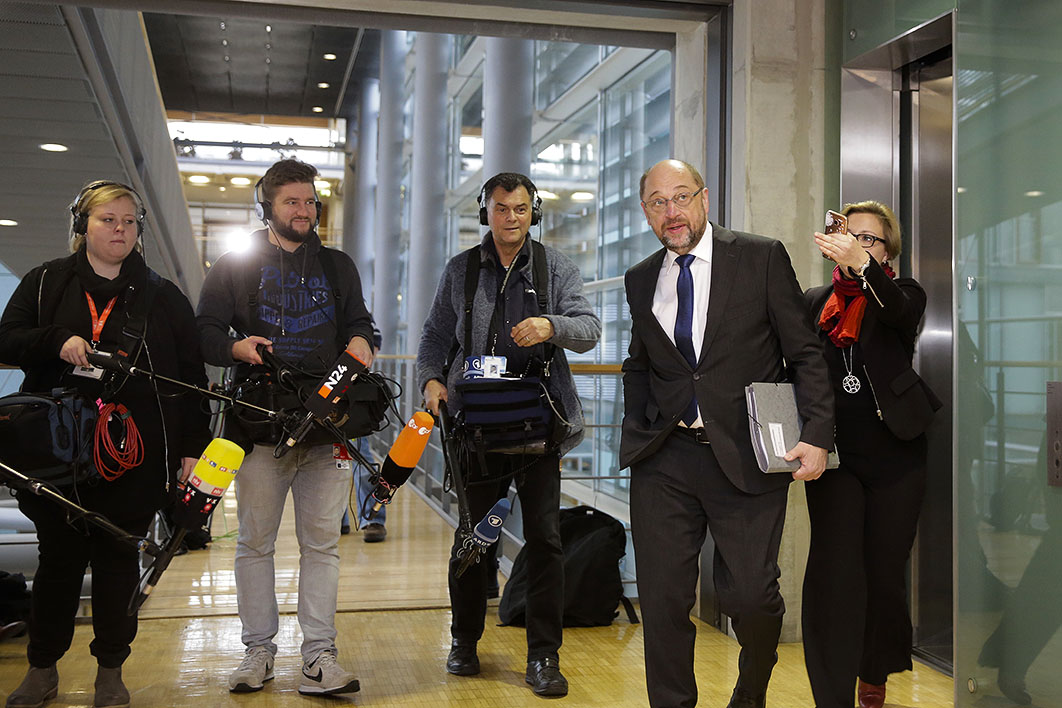
Talking about talks: the Social Democratic Party’s Martin Schulz (second from right) arrives for talks about a new government with chancellor and Christian Democratic Union chair Angela Merkel and Christian Social Union chair Horst Seehofer in Berlin on Wednesday 20 December. Markus Schreiber/AP Photo
Only the Linke and the AfD were in favour of new elections; all other parties fear that they would fare worse than they did on 24 September — or rather, that the AfD would become even stronger.
That left the GroKo, which required the Social Democrats to turn their categorical “no” into a “maybe.” They came under intense pressure to do just that: from Merkel and other leading Christian Democrats, from sections of the media and from German president Frank-Walter Steinmeier, himself a Social Democrat.
And so, at a party congress early this month, the Social Democrats reluctantly agreed to enter into talks with the Christian Democrats. These talks, which took place this week, were not negotiations over the formation of a new government, but rather preliminary meetings, or Vorsondierungsgespräche, to agree to the agenda, format and timing of Sondierungsgespräche. Should these exploratory talks, scheduled for the second week of January, be successful, the parties would then decide whether to enter into formal negotiations.
At that point, the Social Democrats would convene an extraordinary party congress on 21 January to discuss the results of the Sondierungsgespräche. If both sides agreed to conduct proper negotiations, and if these negotiations were successful, then it would be again up to both parties to sign off on the outcomes. The Social Democrats would let their 440,000 members have the final say.
If all goes well, the new government could be in place in March, six months after the election. If there are further hiccups, the process could take a lot longer. There might even be new elections sometime next year, or a minority government led by a Christian Democrat other than Merkel.
In terms of forming a new government, Merkel, Schulz and other leading federal politicians have achieved little in the past three months. All they can show for their efforts are successful preliminary discussions about the format and timing of exploratory talks that in turn might lead to formal negotiations. At the same time, the state politicians in Lower Saxony signed off on a GroKo and elected a new state premier less than six weeks after the elections. It’s no wonder that observers outside Germany are befuddled, sense chaos, and conjure the image of a rudderless Germany.
But the participation of Merkel, Schulz and others in Vorsondierungsgespräche and Sondierungsgespräche has not meant that the business of government has been suspended. Germany is still governed by a coalition between Christian Democrats and Social Democrats. Merkel is the reigning chancellor, and Sigmar Gabriel, a Social Democrat, is her deputy and foreign minister. Cabinet meets regularly; parliament sat for a week in November, and again throughout last week.
In fact, the evidence that the most recent GroKo has been working reasonably well according to the Social Democrats’ own standards — even beyond its official use-by date of 24 September — might convince the party’s leaders to continue in their current role. The question is whether the party’s members would be prepared to go along with that. Many of them were critical of Martin Schulz for being too soft on Merkel during the election campaign. And the party’s influential youth wing, the Young Socialists, or Jusos, have already promised to campaign against a continuation of the current constellation.
When the AfD won 12.6 per cent of the vote in September, it was the first time since 1949 that a party of the far right has been represented in the Bundestag. Yet the second claim I mentioned earlier, that Germany has lurched to the right, is also wrong. First, it’s important to remember that the AfD was already represented in thirteen of sixteen state parliaments, and its vote in September was correctly forecast by all major polls. In fact, according to the pollsters, if the elections had been held a year earlier, the AfD might have done better. Its appearance in the Bundestag should therefore not have come as a surprise.
Second, the vote for the AfD is comparatively modest compared to broadly comparable parties in nearby countries. To Germany’s south, in Austria, the Freedom Party won 26 per cent of the vote in this year’s elections. To the west, the National Front’s Marine Le Pen won 21 per cent of the vote in the first round of this year’s French presidential elections, and 34 per cent in the second. To the north, the Danish government relies on the support of the People’s Party, for which more than one-in-five Danes voted at the last general election. Across Germany’s eastern border, Poland’s government is led by the Law and Justice Party, which attracted almost 38 per cent of the vote in 2015. In fact, of Germany’s nine neighbours, only tiny Luxembourg has a populist party comparable to but proportionally less significant than Germany’s AfD.
Finally, the AfD’s success also needs to be seen in the context of the shifts along Germany’s political spectrum. Under Merkel, the Christian Democrats have moved to the centre, if not the left, to become what is effectively the larger of two major parties with a social democratic agenda. The German equivalents of leading representatives of the political right in other democracies — Donald Trump, Austria’s Sebastian Kurz or even Britain’s Theresa May — could no longer be easily accommodated within Merkel’s party. It has become tricky to compare the electoral appeal of right-wing, conservative-nationalist populist programs across Western democracies; for example, the environmental, refugee and human rights policies pursued by Australia’s Liberal–National coalition government have much in common with those advocated by the AfD, but little with those of the Merkel government.
And to speak of the AfD’s success in Germany is to tell only half of the story. The party might have won 12.6 per cent of the national vote on 26 September, but three weeks later it barely scraped over the 5 per cent threshold in Lower Saxony. Lower Saxony, of course, is in the old West Germany. In the so-called neue Länder, or new states, of the east, the situation is very different. In Saxony, in the country’s southeast, more than a quarter of the electorate voted for the AfD, giving it more support than any other party. Twenty-seven years after reunification, Germany seems politically more divided than ever before.
Although Germany hasn’t lurched to the right and the AfD’s success was predictable and comparatively modest, the election results still came as a shock. More than the question of how to form the next government, journalists, politicians and other public commentators have been preoccupied with the issue of how to deal with the AfD. Should it be ignored? Or should its every hysterical claim be dutifully reported and then countered with reasoned argument?
For the representatives of the other political parties in the Bundestag, the key question has been this: should we try to win back those who voted for the AfD by stealing some of its thunder? Or should we distance ourselves from the AfD, its policies and its rhetoric, and call a spade a spade, identifying the party’s slogans as racist, xenophobic, undemocratic and anti-European, daring voters to cross the red line between sentiments that have been acceptable and those that have not? The leader of the Free Democrats, the Linke’s co-leader Sahra Wagenknecht, the Christian Social Union and the right-wing remnants of Merkel’s Christian Democrats have occasionally tried to lure AfD voters back into the fold by singing from the AfD’s song sheet. But Merkel and other Christian Democrats, the Social Democrats and the Greens have vehemently rejected such an approach.
Merkel and her allies are not necessarily driven only by the desire to be morally principled. They may also have cast their minds back to pertinent developments twenty-five years ago. In 1992, about 440,000 people applied for asylum in Germany, many of them refugees from the former Yugoslavia. The question of how to respond to refugees and asylum seekers dominated the political agenda. Just months earlier, the small Saxonian town of Hoyerswerda had been the scene of pogrom-like riots directed at asylum seekers and migrant workers from Vietnam and Mozambique. The German Willkommenskultur, or culture of welcome, which characterised much of Germany’s response in 2015, was still a long way off; in the early 1990s, most Germans — in the East and in the West — wanted fewer asylum seekers, and many would have liked to refuse protection to anybody claiming to flee war or persecution.
In the second half of the 1980s, a new far-right party, the Republicans, began attracting significant support. When it won 7 per cent of the vote in the European parliamentary elections in 1989, some Christian Democrats did what John Howard would try to do in the second half of the 1990s when faced with the challenge of Pauline Hanson: they began sounding more and more like their far-right challengers, particularly when talking about migrants and asylum seekers.
Ahead of the 1992 elections in the West German state of Baden-Württemberg, leading conservatives were convinced that the Republicans could be kept out of parliament only by reducing the differences between the policies of the Christian Democrats and those of the right-wing extremists. The strategy could not have been more mistaken. Not only did the Republicans win more than 10 per of the vote to become the third-largest party in state parliament; they did so at the expense of the Christian Democrats. Meanwhile, the number of racist attacks mounted.
It could be argued that the AfD’s electoral gains at the 2017 national polls in Saxony paralleled the Republicans’ success at the state level in 1992. In recent years, Saxony’s premier, Stanislaw Tillich, has tried hard not to alienate voters who might sympathise with the AfD. He tolerated the weekly far-right Pegida rallies in Dresden; he defied Merkel by declaring in 2015 that “Islam has no place in Saxony.” Following the AfD’s success on 24 September, Tillich resigned as premier, but it seems unlikely that his successor will change course. Meanwhile, Saxony has recorded a particularly high number of incidents of racist violence directed at asylum seekers and other migrants.
The question of how to deal with the AfD is part of a much broader debate about Germany’s and Germans’ identity, and about their visions of the future. It is playing out at family gatherings and on talk shows. It sets the tone when Germans discuss Europe, refugees, the shortcomings of Donald Trump and Vladimir Putin, or even the Nationalmannschaft, Germany’s national football team.
Live broadcasts of the Nationalmannschaft’s matches are one opportunity for Germans to come together as a community of viewers. Running commentaries shared with family and friends become part of an imagined national conversation. Another opportunity is provided by the popular police procedural Tatort, which is produced by the German, Austrian and Swiss public broadcasters. Having premiered in 1970, it has become the longest-running and most-watched TV series in Germany. Before commercial television began, Tatort episodes sometimes attracted twenty-five million viewers; even now, an average episode has close to ten million viewers. Before and after they’re broadcast, Tatort episodes are extensively reviewed in the print media; often they first screen in cinemas.
Last Sunday night was no different. Tatort’s 1039th episode, “Dunkle Zeit” (dark times), featured two Hamburg-based Federal Police officers, Julia Grosz and Thorsten Falke, the latter played by Wotan Wilke Möhring (perhaps best known to Australian audiences for his part in Fatih Akin’s Soul Kitchen). The pair is given the job of protecting the leader of a far-right political party and finding the killer of her husband.
The similarities between fiction and reality are obvious. The party in the episode, the New Patriots, is obviously modelled on the AfD, although the film is set in Hamburg, rather than, say, Dresden. The New Patriots politician in the crime drama bears uncanny resemblances to former AfD frontwoman Frauke Petry and the current co-leader of the party in the Bundestag, Alice Weidel. The episode’s narrative provides a foil for the protagonists to debate the AfD’s ideology and to try out different responses to the challenge it is posing.
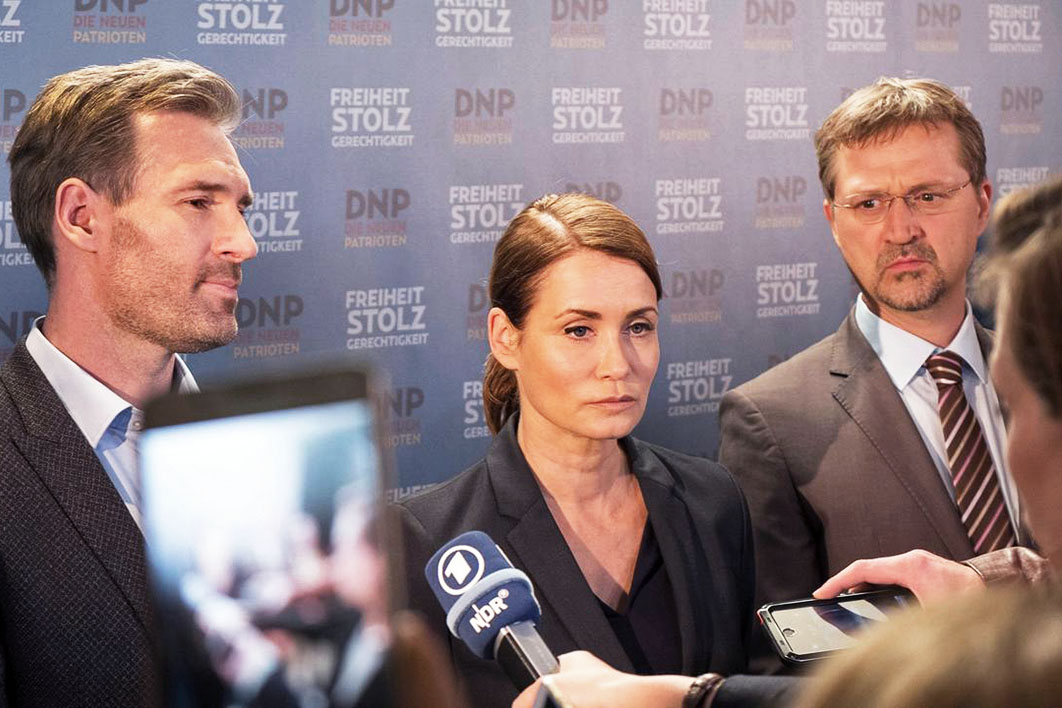
The leaders of Germany’s far right in the Tatort episode “Dunkle Zeit”: party leader Nina Schramm (Anja Kling) flanked by Benjamin Reinders (Ben Braun, right) and Gerhard Schneider (Patrick von Blume). Marion von der Mehden/NDR
The reviews of “Dunkle Zeit” have been mixed. Many see the narrative as drawing on too many stereotypes. Others like the fact that the portrayal of the New Patriots and their leader closely follows the script provided by the AfD. Both on the screen and in real life, the party is influenced by Steve Bannon–like ideologues and drifting ever farther to the right, and has been riven by differences and defections as a result. In the film, a professor of economics with comparatively moderate views who was one of the party’s leaders is being marginalised; in real life, the economist Bernd Lucke, one of the founders of the AfD, left the party in 2015 after having been dethroned by Frauke Petry, who herself quit the AfD immediately after the September 2017 elections because she felt it had become too extremist.
Not surprisingly, the territory covered in “Dunkle Zeit” was too close for comfort for the AfD, whose co-chair, Jörg Meuthen, condemned the Tatort episode as an attempt to brainwash Germans, and another weapon in the public broadcasters’ “ideological battle” with the AfD.
But “Dunkle Zeit” is no piece of left-wing propaganda. It accurately recounts the arguments of the far right, including the claim that Germany is being swamped by foreigners, who are held responsible for a crime wave.
In the episode, the policeman Thorsten Falke acts as the sparring partner of the far-right politician. His views are often as blunt as hers; when the police ask themselves who would benefit from the politician’s murder, Falke quips, “Germany.” He doesn’t necessarily win the contest with the politician — her rhetorical skills are superior to his. But when she tries to argue that “the people” are understandably angry about immigration and crime, Falke demonstrates that there is an effective alternative to a response that would take the far right’s slogans seriously.
Falke says that he grew up in the Hamburg suburb of Billstedt, where “there were always more foreigners than Germans.” As a kid, he says, he was regularly beaten up by his Turkish school mates because he was a non-believer, a “potato.” He then joined a boxing club, and the same kids who had beaten him up were now proud that a German wanted to train with them. The club still exists, Falke continues. “The chairman’s name is Ali, he is a friend of mine, the coaches are called Yusuf, Milan and Kenbala. They are all donating their time. For the past fifteen years, girls have trained there too, many of them Muslims, some wearing a head scarf. That is my Germany.”
In “Dunkle Zeit,” the murderer is eventually caught, but the question of how to respond to the New Patriots remains unresolved. In the Germany of 2017, the question of how to respond to the far right should not be reduced to the question of how to deal with the AfD. Who knows, the AfD might lose seats if new elections were called in mid 2018, and it might disintegrate further if Frauke Petry’s new outfit, the Blue Party, were able to attract more defectors.
Rather, the question is how to respond to those Germans who are attracted by the AfD’s slogans. They include those who felt compelled to vote for the AfD in September, many Linke supporters, as well as others who never participate in elections. Most of them resent the fact that the Germany they want has already been largely replaced by Falke’s Germany. For those trying to curb the AfD’s influence, it will be tempting to pretend that it’s possible for Germans to turn back the clock rather than celebrate a Germany that is more multicultural, more polyglot and more curious about the outside world.
Part of the challenge is that the Germany of 2017 is contradictory. It’s not so long since most Germans, in the former communist East and in the West, were vehemently opposed to asylum seekers. The AfD is a recent phenomenon, but the sentiments shared by its supporters have a long history. AfD voters didn’t suddenly discover that they hated foreigners and inner-city liberals.
The sentiments serviced and fuelled by the AfD are not those of outsiders who are normally only encountered in a Tatort episode. Rather, they are shared by a cross-section of the population, although men, middle-aged Germans and certain professions are over-represented among AfD voters. In “Dunkle Zeit,” the far-right politician observes that many members of her party are police officers. The AfD could make a similar claim.
The last time Federal Police inspector Thorsten Falke featured in a Tatort episode that imitated real life and had a political message was in 2015, in episode 957, “Verbrannt.” It first screened on television on 11 October, a few days after the celebrations of the twenty-fifth anniversary of reunification (which it referenced), and concerns the death in custody of an African man in Salzgitter, a town in Lower Saxony. According to the state police, the man, who was shackled and lying on a mattress in a police cell, died after he set his mattress alight. Falke establishes that policemen tasked with looking after the man murdered him.
“Verbrannt” is a thinly disguised fictional account of the death of Oury Jalloh, a man from Sierra Leone who burned to death in a police cell in the East German town of Dessau in 2005. The police charged in relation to his death were acquitted, but the case has very recently been reopened. The Germany of 2017 is Falke’s Germany, rather than that conjured by the AfD. But the murder of Oury Jalloh is as much part of this Germany as the Willkommenskultur of 2015.
In the Germany of 2017, the AfD is not an aberration. This Germany is not a composition in black and white, where heroes in shining white armour purge the nation of the dark forces of the AfD. Again, Tatort’s fiction is instructive: while “Verbrannt” portrays several state police as racists, Falke himself is not without blame: presumably drawing on skills he acquired in a club that also trains young Muslims wearing a headscarf, he had severely beaten the African man, who had been the subject of a police surveillance operation targeting a ring of drug dealers.
Perhaps the main challenge is not how to deal with the AfD and its supporters, but how not to be blinkered by focusing on the AfD — and lose sight of attempts to sweep the murder of an African man under the carpet, of the Merkel government’s increasingly restrictive asylum seeker policies or, for that matter, of the macho behaviour of men like Falke who are fighting the good fight. •

